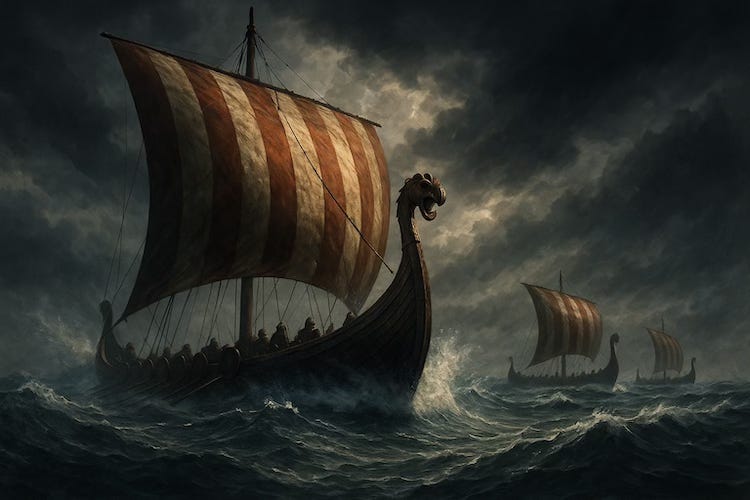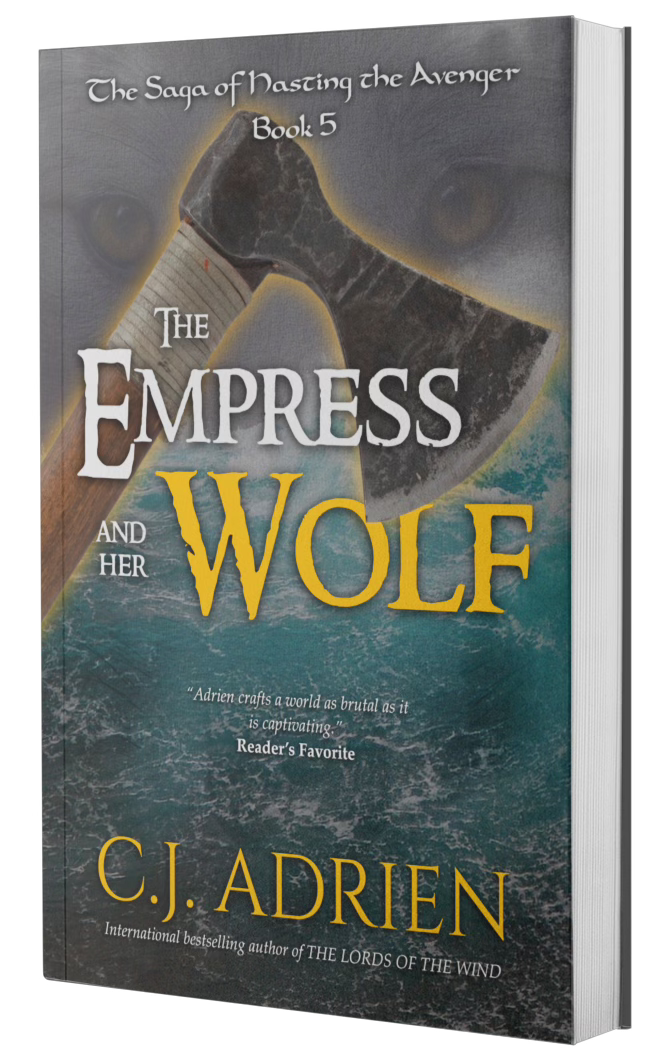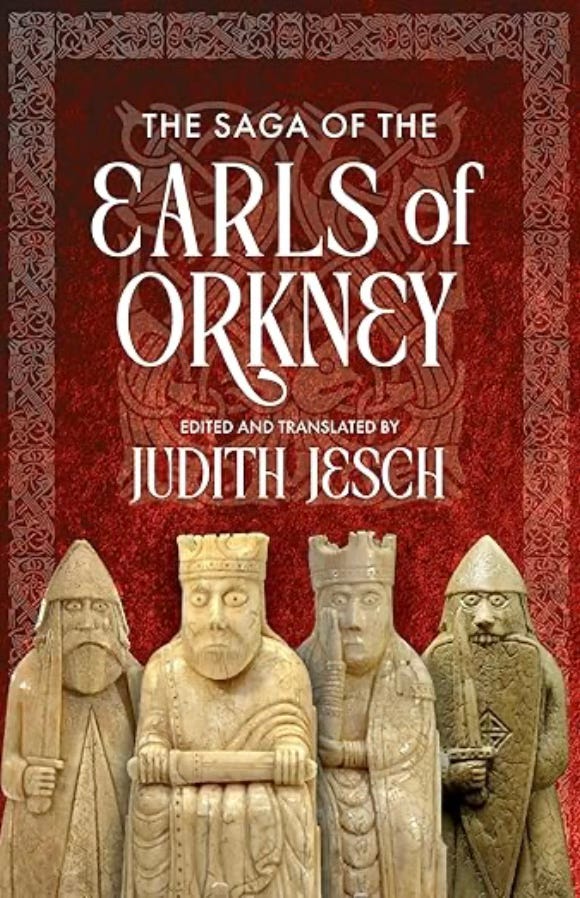Stop Correcting People About ‘Viking’
Revisiting the word 'Viking' | Whoopsie! I Made a Mistake | The Empress and Her Wolf
Welcome to the newsletter, where history, storytelling, and inspiration meet. Every week, I share some of the fun historical research I’ve done while writing my novels, writing reflections (and sometimes tips), and sharing updates on my work and journey. If you were forwarded this message, you can join the weekly newsletter here.
Today’s Dispatch
Viking History: Revisting the word ‘Viking.’
Writing and Publishing: Whoopsie! I made a mistake.
Author Update: The Empress and Her Wolf is Available Now!
This week’s book recommendation.
Viking History
Why You Should Think Twice Before Correcting Others on Their Use of the Word ‘Viking.’
In the world of online discourse about the Viking Age, few topics attract as much controversy as the definition of the word Viking. Every day, I come across posts featuring a deluge of comments from people rushing in to correct others on how they’ve used the word. Most often, these corrections take the form of a now-common refrain: “Viking was a job, not a people.”
I’m not sure where this trend began, but it’s gotten out of hand. The certainty with which it’s repeated belies the actual complexity of the issue. Not only is the “Viking as a job” claim overly simplistic, but it’s incorrect. I say this not as someone new to this conversation, but as someone who has researched, written about, and taught on the subject for years.
In my article "Do You Use the Word Viking Correctly?", I explored this issue in depth and came to a simple conclusion: so long as you define how you intend to use the word, you’re using it correctly.
Let me explain why that matters.
There is no consensus on the origin of the word Viking. Nor is there agreement on its meaning. Even among experts, debates continue over how it was used during the Viking Age, and how it made its way into the English language. That’s not just my opinion. It’s the reality faced by anyone who dives into the scholarship.
Recently, I shared a public service announcement in response to the wave of online corrections:
The tweet received some great responses, including one from renowned Viking Age scholar Judith Jesch. She offered a welcome refinement:
“I would rather say that it is not a matter of ‘consensus’, rather one of multiple origins, multiple meanings (over time and different languages), multiple uses in the Viking Age, and multiple entries into the English language. You could even say, multiple words.”
Her words capture the issue perfectly. Viking is a word with layers. It doesn’t belong to a single definition or etymology. It evolved over centuries, crossing linguistic and cultural boundaries, and took on different meanings depending on the time and place.
That brings us back to the most important point: unless you're engaging in a scholarly debate within a very specific context, what's far more useful than correcting someone’s use of the word is asking what they mean by it. If they define it clearly—whether they use it to mean a seaborne raider, a Scandinavian explorer, or even a broader cultural identity—then that definition should frame how the word is interpreted.
Ultimately, Viking is a complex, nuanced, and still somewhat enigmatic term. And that’s okay. Words often carry many layers of history. But using that complexity as a blunt instrument to shame or “correct” others is counterproductive. Instead, I encourage everyone passionate about the Viking Age to adopt a little humility. Dig deeper. Ask questions. And remember: if someone is using the word Viking with a clear definition in mind, they’re using it correctly.
Let’s foster better conversations, not pedantic ones.
Writing and Publishing
Whoopsie! I Made a Mistake…
A sharp-eyed reader (thank you, Emma!) pointed out a name inconsistency between The Fell Deeds of Fate and The Empress and Her Wolf. Specifically, a character named Theresa in the former appears as Eyvor in the latter, with no explanation.
Here’s what happened: during the many rewrites of The Empress and Her Wolf, a key line was accidentally cut in the back-and-forth with editors and proofreaders. That line was meant to clarify the name change:
“In court, she went by the Christian name Theresa, but among our kin, she preferred we call her by her birth name, Eyvor.”
The detail was intentional. I wanted to reflect the dual identity of a Rus courtier who had assimilated into Byzantine culture, yet—when confronted with her kin—reverted to the name of her heritage. It was a subtle nuance, intended to reflect the emotional and cultural complexities of emigration and identity. Unfortunately, it didn’t make it into the final cut.
The good news is: the line has now been restored in the current version of the novel.
However, if you pre-ordered or purchased The Empress and Her Wolf on release day, your copy won’t include it. I’m truly sorry for the oversight. Please know that Eyvor and Theresa are the same person, and the change was deliberate from the start. In all my outlines and planning notes, she’s always been Eyvor.
Thank you again to everyone reading, and especially to those who take the time to point out things that slip through the cracks. Your support means the world 🙏
Author Update
The Empress and Her Wolf
The Empress and Her Wolf, book 5 of the Hasting Saga, hits shelves TOMORROW. Here’s the blurb:
Power. Revenge. Forbidden love in the heart of a dying empire.
When Viking warlord Hasting arrives at the gates of Constantinople, he knows he can’t conquer it. Not with deeds of arms alone. But fate has other plans.
A failed raid turns into a devil’s bargain: serve Empress Theodora as her sword-for-hire, or die. Hasting chooses survival and quickly proves himself more capable than the generals she no longer trusts. But the empire is a viper’s nest of betrayal, and when an attempt to scare off his men ends in the death of his lover, Hasting’s mission changes.
He came for wealth and glory. Now, he wants blood.
But revenge in Miklagard is no simple feat. The city runs on whispers, not war cries. Enemies hide behind silks and smiles. And as Hasting grows closer to the empress—ally, ruler, and eventually lover—he finds himself torn between love and vengeance.
One wrong move could cost him everything.
Perfect for fans of Bernard Cornwell, Giles Kristian, Peter Gibbons, and Conn Iggulden, The Empress and Her Wolf is a heart-pounding saga of war, loyalty, and ambition set against the glittering, dangerous world of the Byzantine Empire.
Book Recommendations
The Saga of the Earls of Orkney by Judith Jesch
Judith Jesch, one of the foremost scholars of the Viking Age, has a new book available for pre-order: The Sagas of the Earls of Orkney, set to release in January.
We recently had the pleasure of hosting Professor Jesch on the Vikingology podcast, where she shared insights from her ongoing research into the rich literary and historical traditions surrounding the Orkney earls. Her deep knowledge and fresh perspective made for a fascinating conversation—and if that’s any indication, this new book will be a must-read for anyone interested in saga literature, Norse culture, and the complexity of power on the northern fringes of the Viking world.
Whether you’re a casual fan or a serious student of the era, this upcoming release promises to offer a compelling look into one of the most enduring and enigmatic branches of the Norse legacy.
Check out the episode on Vikingology:
Blurb:
This fascinating history of the Earldom of Orkney, which was established in the Viking Age, records the adventures, feuds and battles of powerful Norsemen during its first three centuries. The medieval earls of Orkney owed allegiance to the kings of Norway but their influence ranged from Britain and Ireland to Sweden and Russia, and they travelled as far as Narbonne, Crete and Jerusalem. Advised by bishops and formidable women, they and their henchmen jockeyed for power with each other and with neighbouring rulers in Scotland, often with murderous outcomes. In between the high politics and violence, the world of the earls was one of piety, poetry and feasting.
The Saga also provides rare glimpses of culture and everyday life in northern Scotland when it was central to the Viking diaspora. Set in a recognisable landscape, it mentions features, sites and even buildings that can still be seen today.
This new translation of the manuscripts of the Saga uses an innovative approach to presenting medieval sources to non-specialist audiences, highlighting textual variations that affect its interpretation. It also reflects saga style and language more closely than previous translations and is ideal for both research and reading aloud. This is an essential, detailed and up-to-date resource for academics and general readers who wish to know more about Viking and Norse Scotland.










Interesting thoughts on the word viking! Judith is, of course, correct. All words can change in use and meaning over time, and 'viking' is no different. For me, if someone is really interested in actual vikings, the important thing to try and understand is whether and how THEY used the word in THEIR own time, i.e., during the Viking Age. That's really all that matters because, despite some people's wishes to the contrary, vikings don't exist anymore. Anyone interested in this should check out Judith's 2001 book Ships and Men in the Late Viking Age: The Vocabulary of Runic Inscriptions and Skaldic Verse. In it she discusses the original sources -- runic inscriptions and skaldic poems -- where the word viking is found, and which variously seem to have meant an activity (piracy), the person doing that activity, or sometimes used to describe a member of an in-group but more often seems to have been a pejorative directed toward an outsider.
Additionally, look at the languages used then. In Old Icelandic for instance, the dialect of Old Norse spoken in the Viking Age in Iceland, the word víkingr was used to describe a “freebooter, sea-rover, pirate” -- again a person doing a particular activity. So, the "it's a job" people are not far off the mark. I would also argue that there is consensus, to the extent that it matters, that 'viking' is not an ethnic classification.
Lastly, I'd urge caution in saying we can make words mean whatever we want as long as we can define what we mean when using them first. As you say in this post, someone's definition can frame how the word is being interpreted, which is certainly true, but that does not, ergo, mean they are using the word correctly. At least in the scholarly community I do think we have a general sense of what we mean when we say viking; it's not wide open. And I think we do have to agree there are some objective truths to words and their meanings that are not changeable simply based on who is able to create a definition; the incorrect ethnic classification of 'viking' is a good case in point. If that's not the case, and words can be manipulated so easily, then I'm afraid we'll all be living in an Orwellian nightmare pretty quickly.